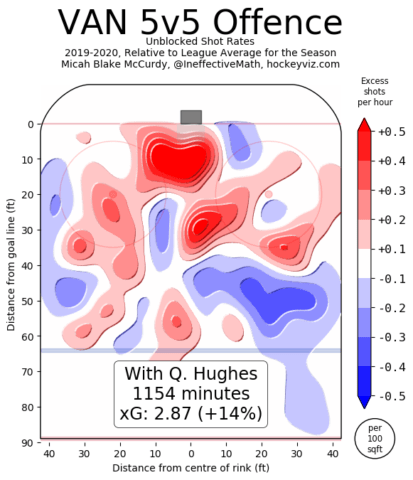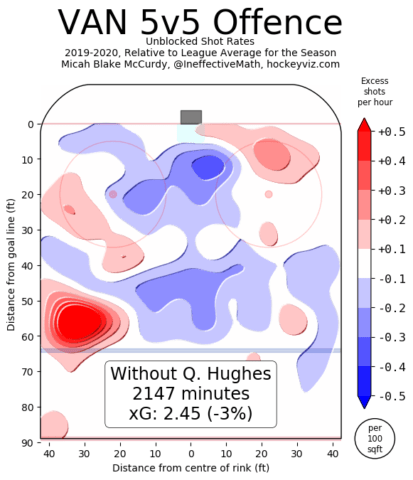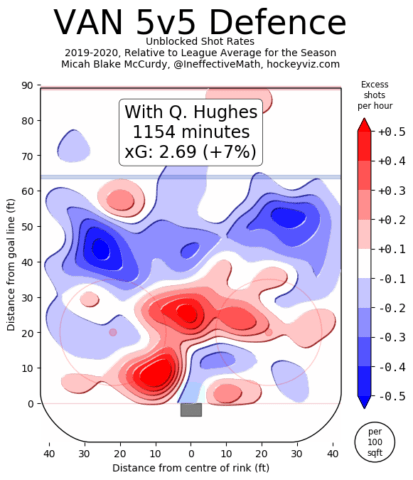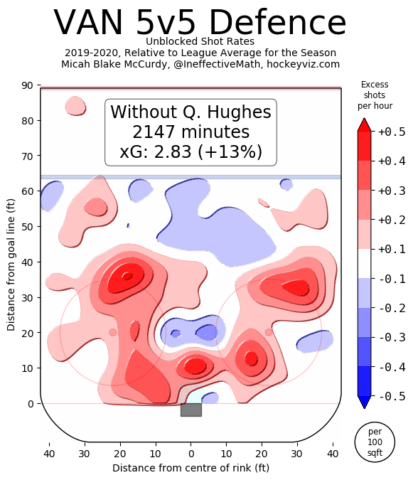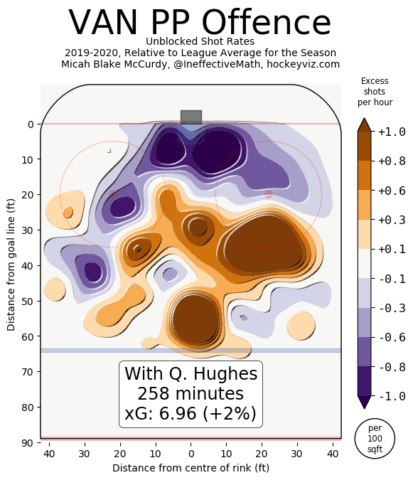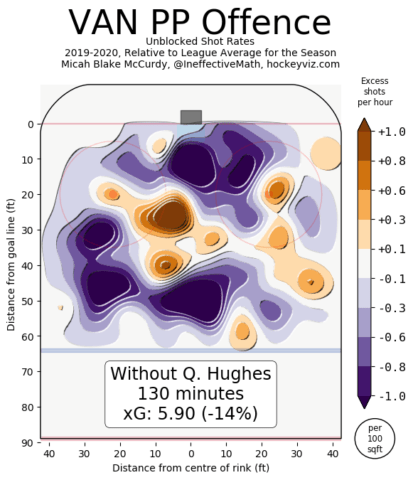The timeless question of how to build the perfect hockey team has never truly been answered. Everyone, from general managers to the average fan, seems to have a different opinion on how their team should be built.
Some teams try and build from the back out, prioritizing goaltending and defence. There are people who believe the biggest positional need on a contending team is a true No. 1 defenceman. However, there is another school of thought that suggests the best defence is a great offence, preferring to prioritize a talented forward group. A No. 1 center is the key to this theory – that is the position that is required for a successful, Stanley Cup-contending team.
Related: 3 Greatest Canucks Forwards of All-Time
I started thinking about this question again when TSN1040 posted a poll question last week, asking followers which young Vancouver Canucks star (Elias Pettersson or Quinn Hughes) would they rather keep. The results were mildly surprising:
Hughes edged out Pettersson in the poll, suggesting fans would rather have the No. 1 blueliner than the center. The line of thinking is totally fair – the young defenceman is electric and is on pace to become the best D-man in team history. However, I did wonder if some recency bias crept into play and felt this was likely a topic worth exploring further. Did the fans get it right?
Related: Canucks’ Hughes and the Calder Race
Obviously both players would ideally be Canucks for their entire careers, but what if only one of them could be kept? It’s a tough question – one that will hopefully never need to be answered, but one we will answer right here, right now.
Quinn Hughes
Starting with the poll winner, Hughes emerged as a legitimate No. 1 defenceman in his rookie season.
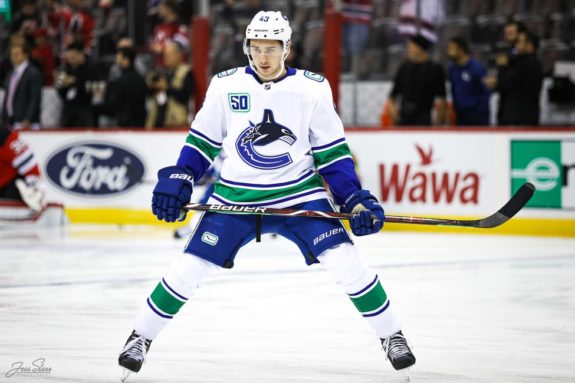
The rookie star performed like a top-20 defenceman in the 2019-20 season when looking at Evolving-Hockey’s Goals Above Replacement (GAR) metric.
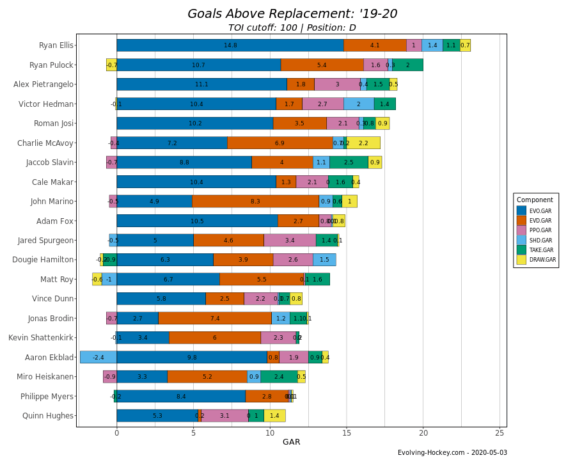
That’s elite company, with Hughes performing to the standards of established stars like Miro Heiskanen, Aaron Ekblad and Jared Spurgeon. He is clearly the Canucks’ best defenceman, scoring ahead of consensus No. 2 blueliner Alex Edler.
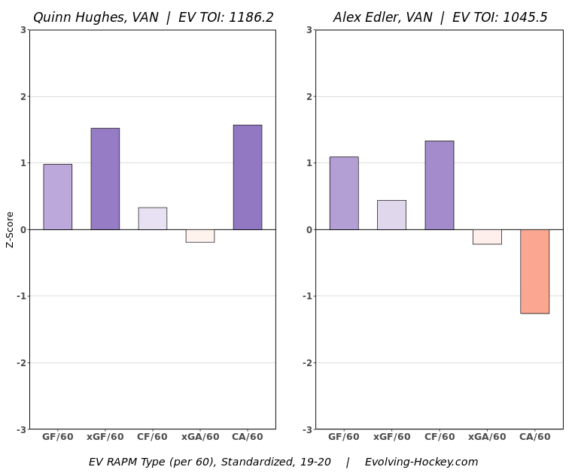
Hughes and Edler actually had relatively similar offensive impacts, but where the former shined was his defensive play. The young star was consistently driving offence and was able to control the puck when he was on the ice. Vancouver was always better, both offensively and defensively, when he was on the ice. Offensively, the Canucks were 17 percent more dangerous at five-on-five. The charts from Micah Blake McCurdy show just how much of an impact this is – red means more shots, and dark red means a higher volume of shots from that location.
Meanwhile, the Canucks were porous defensively when Hughes was off the ice. Opponents were six percent more likely to score and were generating more dangerous shots when he was on the bench.
When looking at Hughes’ profile, there are two underrated aspects which aren’t talked about enough. The first is his power-play impact. He added an entirely new dimension to the Canucks’ power play this season – his ability to walk the blueline and create space allowed him to establish himself as a legitimate shot option.
The chart on the left clearly shows that most of the Canucks’ power-play shots come from the point and the right faceoff circle. To those who watch the team, this definitely checks out – Hughes would account for the point shots, while his passes to Pettersson at the faceoff dot make up the other massive shot location. Meanwhile, the chart on the right displays the struggles of the second unit, speaking further to the prowess of the first unit.
Hughes controls the Canucks power-play and has helped elevate it to another level, ranking fourth in the league at 24.2 percent. With him at the point and Pettersson at the faceoff dot, Vancouver is poised to have a dominant power-play for years to come.
Related: Mark Messier – NHL Legend and 6-Time Stanley Cup Winner
The second underrated part of Hughes’ game is how he carried his defence partners this season. As a rookie defenceman, it’s hard to imagine he would be the one to help his veteran partners, but that’s exactly what happened. Namely, Chris Tanev was a big benefactor of playing alongside his freshman partner.
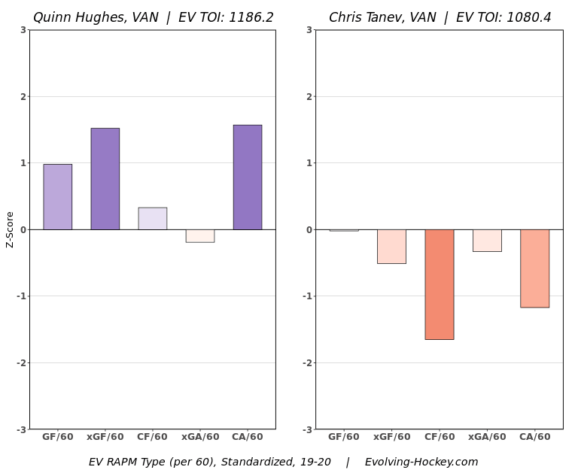
Tanev has been a warrior for the Canucks for many years, but it’s no secret his play has started to decline. He may have looked rejuvenated at times this season, but Hughes was masking his overall poor play. The former bled shot attempts against while generating almost nothing himself. Offence isn’t expected to be a part of his game, but it isn’t unreasonable to suggest he needs to play stronger defence than last season. To back this up, the rookie sensation performed even better when away from his usual partner.

Hughes performed far better away from Tanev, while the latter was abysmal when paired with any other defenceman. They were likely only paired together so other pairings could be together, and so the former could cover the latter’s weaknesses.
Related: Canucks’ Free Agents: Who Stays & Who Goes
No doubt about it, Hughes had an outstanding rookie season and will be a keystone piece for the Canucks for many seasons to come. However, is it worth it to keep him over Pettersson?
Elias Pettersson
Pettersson followed up his exceptional rookie season with an even more dominant sophomore campaign.
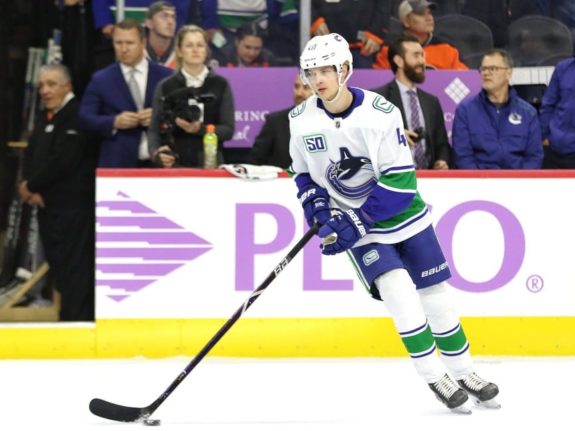
Pettersson is truly the motor that keeps the Canucks running. Offence runs through him, his defensive game and effort levels are outstanding, and he’s overall the team’s best player.
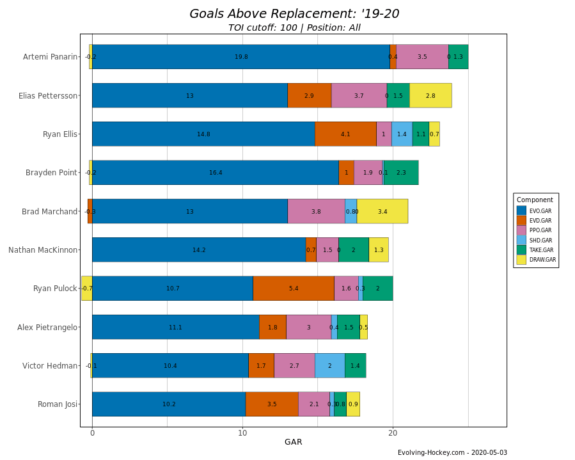
As shown in the previous section, Hughes was the 20th-ranked defenceman based on Evolving-Hockey’s GAR model. Using the same model, Pettersson ranked second among all skaters – not just forwards, all skaters. He had an incredible season, performing favorably to stars like Brayden Point, Brad Marchand and Nathan MacKinnon. He established himself as a true superstar in his second season, something the Canucks desperately needed.
The impact Pettersson has had on his team cannot be overstated. He has transformed the way the Canucks are viewed and the way they play. Vancouver is a much scarier team with him as the primary driver.
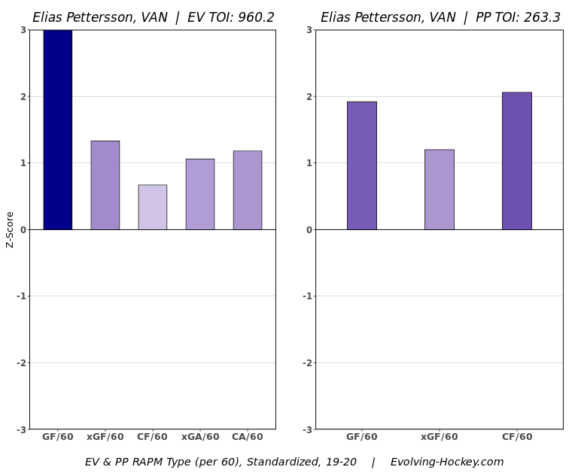
Pettersson is a master at generating quality scoring chances. He manages to do this without sacrificing defence too; he manages to suppress scoring chances and shots against while generating the most on the team.
One of Pettersson’s greatest strengths is his ability to make his teammates better. Every player he has played with for a significant amount of minutes has seen a positive impact in their play driving and scoring numbers. The below data from NaturalStatTrick verifies this – all data is at five-on-five:

The above players represent Pettersson’s most common linemates last season. Each player performed significantly better in shot and goal numbers when playing with the Swedish star. It should be noted, however, that he did not perform as well in these metrics away from JT Miller – the two players clearly complemented each other well.
Pettersson has continued to show he is the best player on the Canucks. He has changed the way the team has played and has a major influence on his teammates. Despite this, is it worth it to keep him over Hughes?
Who to Pick?
Who to pick would likely come down to the individual’s team-building philosophy.
Some people may pick Hughes, and it would be hard to fault them. He’s everything you want in a modern NHL defenceman; a smooth skater, excellent puck mover, and the ability to generate offence without sacrificing defence. He is an excellent player and will be a core member of the Canucks for years to come.
Related: Top 3 All-Time Canucks Goalies
That said, Pettersson is the better player. He makes everyone around him better and is already one of the top players in the entire league. Teams are lucky to have a player like him – he is the quintessential building block for Vancouver.
It’s impossible to say which pick would be better overall, but it’s hard to go wrong with either of these two young stars. Fortunately for the Canucks, they will hopefully never have to make that choice.
